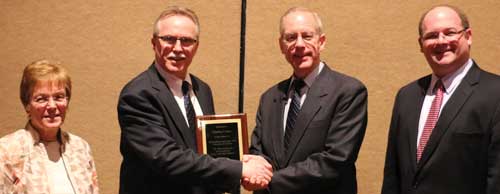by Ashley Bray, Managing Editor, Sign Builder Illustrated, reprinted with permission, www.signshop.com
In a market as small, yet convoluted, as the sign industry, manufacturers often need additional help getting their products into the hands of suppliers/distributors, architects/specifiers, and most important, sign shops like yours.

Right: Attendees at the 2015 ISA Sign Expo learned more about reps during Cohon’s presentation, “The Value Independent Sign Representatives Bring to the Sign Industry.”
Enter independent sales representatives. These reps have served the sign industry for many years and often play a big part in bringing products to market. Yet they remain a little-known entity.
Reps typically have a background as a distributor or a direct sales associate for a manufacturer but choose to switch careers to avoid the relocation that often comes with a direct sales job. “The thing that a rep brings is expertise in a specific market in a specific territory,” says Charles Cohon, CEO and president of Manufacturers’ Agents National Association (MANA).
Territory and expertise is just how manufacturers typically search for reps. They find them through databases and lists from trade associations like MANA or by networking with other manufacturers for recommendations at events and tradeshows.
The most common reason for hiring a rep is the cost savings when compared to hiring an in-house sales team. Reps can also help to position a new manufacturer in a market or help an existing manufacturer break into a new territory. Reps offer physical proximity in territories manufacturers may be distant from for face-to-face exchanges and office visits. “They have a deeper level of rapport with customers than someone who is only stopping over in a territory,” says Cohon.
So what benefit does all of this bring to sign shops? Better service and access to more products.
Unlike a sales associate that represents one manufacturer’s products, an independent rep will build up a line card of complementary, non-competing lines of products. “A rep can sometimes take the products of three or four different manufacturers and create a package that no one manufacturer selling on a direct basis could,” says Cohon. “It’s more efficient for the sign shop because [a rep is] then in a position to talk to them about two or three different products.”
A rep typically works on commission, but shops shouldn’t jump to the conclusion that a rep is only out to make a sale. “A rep generally is more interested in earning a customer,” says Cohon. “He or she is going to be in that territory for another two or three decades. If they step on somebody’s toes, they’ve lost 20 or 30 years of business from that customer as opposed to just a single sale.”
It’s this dedication to relationships that results in better service for shops.
Bill Yorston presents Charles Cohon with a plaque thanking him for presenting “The Value Independent Sign Representatives Bring to the Sign Industry” at the International Sign Expo

Left to right: Susannah Hart, MRERF; Bill Yorston, Yorston and Associates;
Charles Cohon, MANA; and Ken Peskin, International Sign Association.

